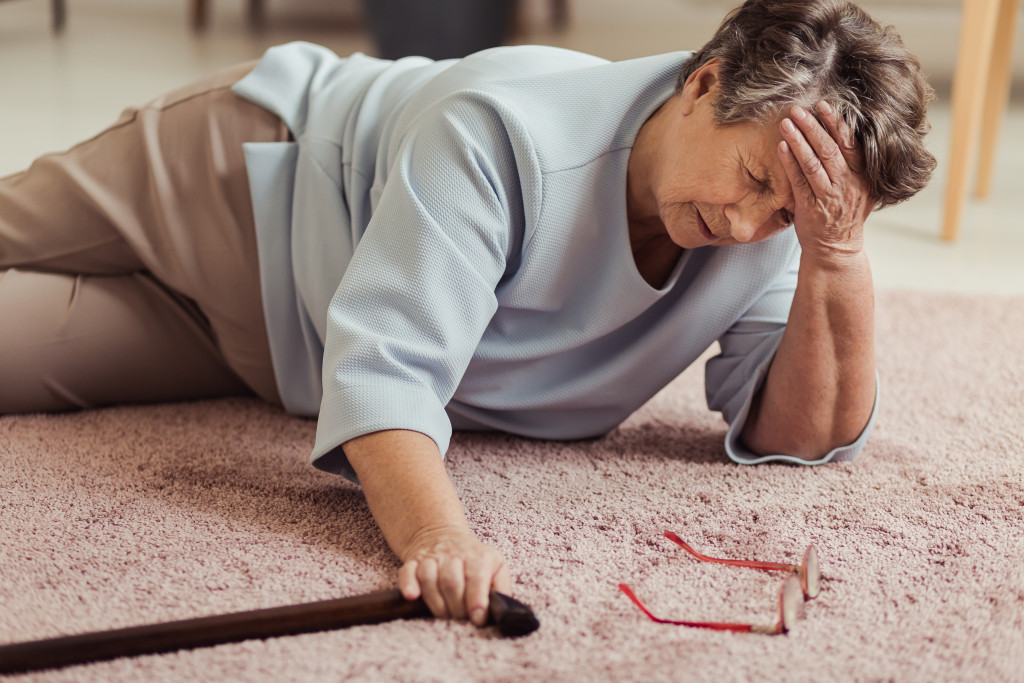As elderly individuals age, their bones become weaker. This introduces issues with balance and mobility, which makes them more vulnerable to slipping and falling. This is not an uncommon occurrence, as the CDC reports that one out of four older adults in the United States suffers from a fall each year.
Still, falls can be distressing situations. When they are not immediately attended to, falls could also cause further injuries and health complications in the long run. The main goal is to prevent them from happening entirely, but taking care of senior family members also means being prepared should these events occur.
What to Do When a Fall Occurs
Despite the precautions you and your family members take, accidents can still occur. The first thing you must remind yourself of in this situation is to remain calm. It is a shocking event, but you need to soberly make decisions so that your older family member receives the care they need.
Here is what to do:
- Calmly guide your loved one to take slow and steady breaths.
- Check if there are visible injuries, such as cuts, bruises, sprains, or broken bones. See if there is bleeding, too.
- Ask if they are currently experiencing pain and let them point out its location and severity.
- If the pain makes them unable to move, call 911 to get immediate assistance from a professional. Keep speaking with them and see how you can help them feel comfortable as you wait for responders to arrive.
- If they can get up, slowly help them onto their side, where they can roll onto their stomach and get on their hands and knees. You can then support them as they try to stand up, one leg at a time. Do not pull them up. Just let your loved one use you as support to stand so that they can take a seat on a chair.
- Even when they look okay, contact their doctor to see what kind of treatment they should receive, if any. One thing to note is that if they hit their head, they may need an MRI a couple of days later to check for head injuries. Some hospitals and clinics also offer open and upright MRI services, which may be easier for seniors with claustrophobia.
How to Safeguard Your Home from Falls

A fall can negatively affect your senior loved one’s life. Here are a few ways to protect them from such accidents.
-
Invest in non-slippery floors and stairs
Many falls occur due to slippery floors. Walk around your home to assess which areas are more accident-prone. Also, ask your loved one if there are places that are harder for them to access so that you can address these.
One thing to pay attention to is the placement of your rugs and carpets. Some rugs can cause slips when stepped on, so purchase non-slip rugs or modify your rugs at home with rug tape, caulk, and similar materials. For carpets, make sure they are properly fastened to the right flooring.
The stairs are also a crucial place to secure as falls more commonly occur in this part of the house. Make stairs slip-proof by placing covers or adhesive tape on each step. Have sturdy railings, too, that your older loved one can hold on to as they go up and down.
-
Remove obstacles around the house
You should also check if the layout of your home makes it complicated for older loved ones to get from one point to another. Look at how your furniture is arranged and see if you can further open up the space so that there are little to no hindrances when walking through different areas of the home.
As you rearrange, pay attention to where items are placed, too. Are there small things that could fall on the floor and cause an injury? Are frequently used items easily reachable? Make sure that you also have good light fixtures to adequately light every room, especially at night.
-
Accompany your loved one when necessary
Sometimes, senior citizens will still need additional support to travel around the house safely. Consider living with them so that you can watch over them and avoid issues from occurring. If you cannot do this, hire a professional caregiver to take care of your loved ones and support them through their various activities.
Older adults experience more health issues due to their age, but keep in mind that you can always help improve their quality of life—first, by making the home a safer place to be in.
